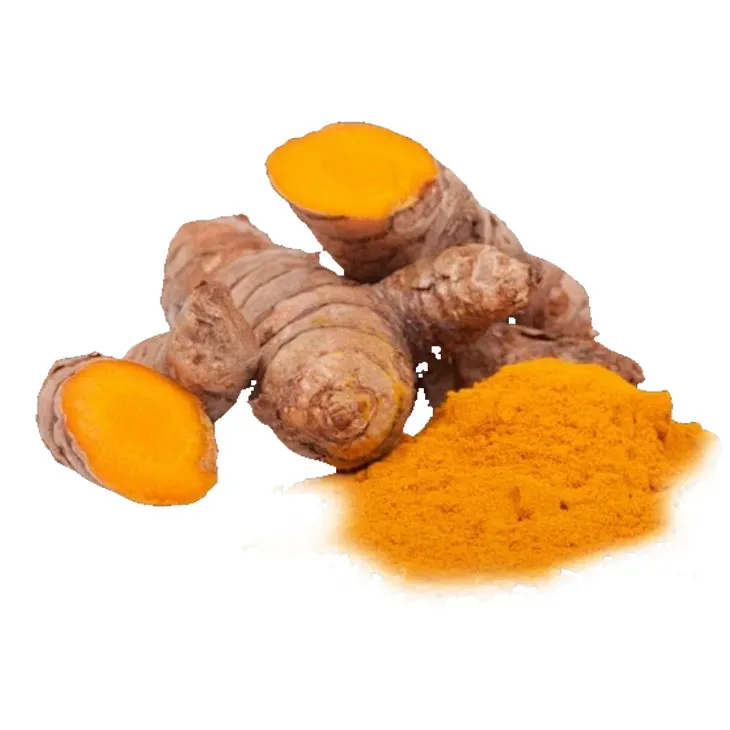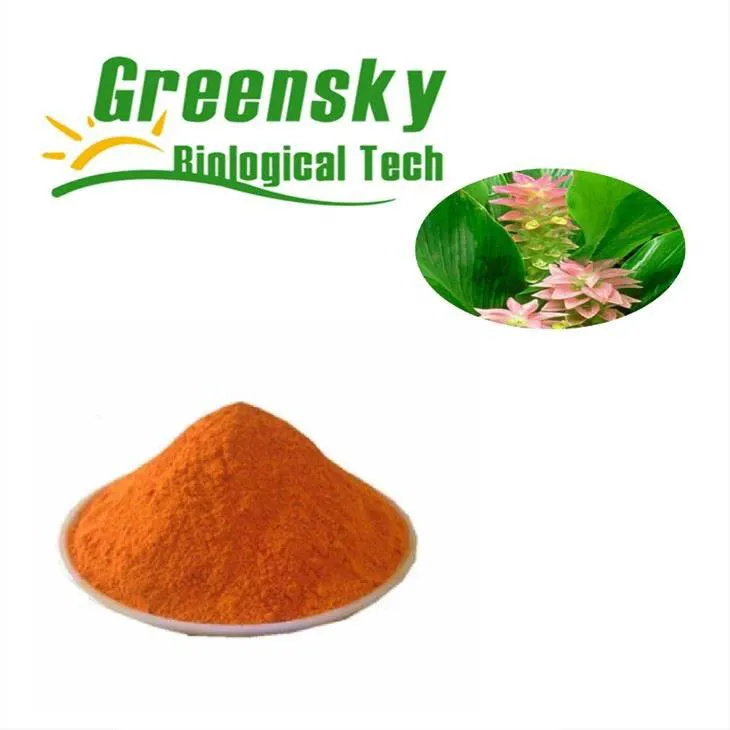- 0086-571-85302990
- sales@greenskybio.com
Is It OK to Take Curcumin Daily?
2025-03-18

Curcumin, the active compound found in turmeric (Curcuma longa), has long been hailed as a powerful natural remedy in traditional medicine. With its vibrant yellow hue and potent anti-inflammatory properties, Curcumin has been used for centuries to relieve pain, treat wounds, and support overall health. Today, Curcumin is one of the most popular dietary supplements worldwide, recognized for its potential to fight inflammation, oxidative stress, and chronic diseases. Given its widespread use, many people wonder whether curcumin is safe to take daily and whether regular supplementation can deliver lasting health benefits. This article explores the benefits of curcumin, its safety profile, potential risks, and tips for responsible daily use.
What Is Curcumin?
Curcumin is a naturally occurring polyphenol found in turmeric, a spice commonly used in culinary preparations and traditional medicine. It is the main ingredient responsible for turmeric’s therapeutic properties. Studies have shown that curcumin has powerful anti-inflammatory, antioxidant, antimicrobial, and anticancer properties, making it a versatile compound with widespread health benefits. However, while turmeric contains only 2–8% curcumin by weight, curcumin dietary supplements are available in concentrated forms, offering higher dosages for more targeted health outcomes.

Benefits of Taking Curcumin Daily
Research has uncovered a wide range of health benefits associated with curcumin supplementation. Daily intake, when appropriately managed, may provide significant advantages for overall health and well-being.
1. Anti-Inflammatory Effects
Curcumin is an effective natural remedy for inflammation. Chronic inflammation is linked to numerous conditions, including arthritis, heart disease, diabetes, and neurodegenerative disorders like Alzheimer’s disease. Curcumin works by inhibiting inflammatory pathways and reducing the activity of inflammatory cytokines and enzymes like COX-2. By taking curcumin daily, individuals suffering from chronic inflammatory conditions may experience reduced symptoms and improved quality of life.
2. Antioxidant Properties
As a potent antioxidant, curcumin protects the body from oxidative stress caused by free radicals. Oxidative stress can damage cells and contribute to aging, cancer, and various chronic diseases. Regular curcumin supplementation helps neutralize these harmful molecules, promoting cellular health and reducing the risk of disease.
3. Supports Joint and Muscle Health
Curcumin is widely used to manage joint pain and stiffness, particularly in conditions like osteoarthritis and rheumatoid arthritis. Its ability to reduce inflammation and prevent cartilage degradation has been well-documented. Athletes and active individuals may also benefit from curcumin’s muscle-recovery properties after intense physical activity.
4. Enhances Brain Health
Curcumin has shown promise in protecting brain health, particularly in reducing neuroinflammation and preventing cognitive decline. It may enhance brain-derived neurotrophic factor (BDNF), a protein involved in brain function and repair, potentially improving memory and learning abilities. Daily curcumin intake may help protect against neurodegenerative diseases like Alzheimer’s and Parkinson’s.
5. Promotes Heart Health
Curcumin supports cardiovascular health by improving blood vessel function, reducing inflammation, and lowering levels of bad cholesterol (LDL). It may also prevent oxidative damage to the heart and reduce the risk of heart disease in individuals prone to cardiovascular issues.
6. Improves Digestive Health
Curcumin has been used traditionally to relieve digestive issues like bloating and indigestion. It supports gastrointestinal health by reducing inflammation in the gut lining and promoting healthy gut microbiota. Individuals with inflammatory bowel diseases (IBD) such as Crohn’s disease or ulcerative colitis may benefit from daily curcumin supplementation.
7. Potential Anti-Cancer Properties
Curcumin is being investigated for its role in cancer prevention and treatment. Studies suggest that curcumin can inhibit tumor growth, prevent the spread of cancer cells, and promote the death of malignant cells. Though far more research is needed, incorporating curcumin as part of a preventive lifestyle may offer additional cellular protection.

Is It Safe to Take Curcumin Every Day?
For most healthy individuals, taking curcumin daily in recommended doses is considered safe. However, it is essential to evaluate dosage, duration of use, and individual health conditions to ensure safe supplementation.
1. Recommended Dosage
The safe daily dosage of curcumin depends on the individual and the specific health goals. Clinical studies often use doses of 500 to 2,000 milligrams per day, usually divided into multiple doses. Most commercially available supplements fall within this range. It is essential to follow the manufacturer’s instructions or consult a healthcare provider to determine the appropriate dosage for your needs.
2. Bioavailability Considerations
Curcumin has low bioavailability, meaning it is not easily absorbed by the body. To address this, many supplements include Black Pepper Extract (piperine), which enhances absorption, or use formulations such as liposomal curcumin or curcumin nanoparticles for improved efficacy.
3. Potential Side Effects
While curcumin is generally safe, some individuals may experience mild side effects, including:
- Digestive issues, such as nausea or diarrhea
- Stomach discomfort
- Dizziness or headaches (rare)
These side effects often occur if the dose is too high. Adjusting or lowering the dosage typically resolves these issues.
4. Drug Interactions
Curcumin may interact with certain medications, including blood thinners (like warfarin), medications for diabetes, and drugs that affect stomach acid. Such interactions may increase the risk of adverse effects. If you are taking medication, consult a healthcare provider before using curcumin.
5. Long-Term Use
While short-term use of curcumin is considered safe, the long-term effects are still being studied. Daily supplementation should ideally be complemented by regular check-ins with a healthcare provider, especially for individuals with underlying health conditions.

Who Should Avoid Curcumin?
Certain groups of individuals should exercise caution or avoid curcumin supplementation:
- Pregnant and breastfeeding women (insufficient safety data)
- Individuals with gallbladder issues (curcumin may increase bile production)
- Those taking blood-thinning medications

Best Practices for Daily Use
To maximize the benefits of curcumin while minimizing risks, follow these recommended practices:
1. Choose High-Quality Supplements
Purchase supplements from reputable brands that use enhanced formulations for higher bioavailability. Look for third-party testing certifications to ensure safety and efficacy.
2. Stick to Recommended Dosages
Avoid exceeding the recommended daily intake, as higher doses may lead to side effects. Start with a lower dose and gradually increase as needed.
3. Monitor Your Health
Pay attention to how your body reacts to curcumin. Discontinue use and consult your doctor if you experience adverse effects.
4. Consider Medical Supervision
If you have chronic health conditions or are taking prescription medications, speak to a healthcare provider before starting curcumin supplementation.

Conclusion
Curcumin is a versatile and powerful natural compound with numerous health benefits, particularly in managing inflammation, oxidative stress, joint pain, and cognitive function. For most people, taking curcumin daily at recommended doses is safe and could support long-term health and wellness. However, as with any supplement, it is important to use curcumin responsibly, consider bioavailability-enhanced formulations, and consult a healthcare provider if you have underlying health concerns or are taking medications.
With proper use and monitoring, curcumin can be a valuable addition to your daily health routine, offering a wealth of protective and restorative benefits to enhance your quality of life.
- ▶ Hesperidin
- ▶ citrus bioflavonoids
- ▶ plant extract
- ▶ lycopene
- ▶ Diosmin
- ▶ Grape seed extract
- ▶ Sea buckthorn Juice Powder
- ▶ Beetroot powder
- ▶ Hops Extract
- ▶ Artichoke Extract
- ▶ Reishi mushroom extract
- ▶ Astaxanthin
- ▶ Green Tea Extract
- ▶ Curcumin Extract
- ▶ Horse Chestnut Extract
- ▶ Other Problems
- ▶ Boswellia Serrata Extract
- ▶ Resveratrol Extract
- ▶ Marigold Extract
- ▶ Grape Leaf Extract
- ▶ blog3
- ▶ blog4
- ▶ blog5
-
Can curcumin have side effects?
2025-03-18
-
Curcumin Extract: When Should You Take It?
2025-03-18
-
What Is Curcumin Extract Used For?
2025-03-18
-
8 Benefits of Curcumin
2025-03-18
-
Is Curcumin a Plant Extract?
2025-03-18
-
Nettle Root Extract
2025-03-18
-
Dan Shen Root Extract/Salvia Root Extract
2025-03-18
-
Red Vine Extract
2025-03-18
-
Moringa powder
2025-03-18
-
Troxerutin
2025-03-18
-
Purple Sweet Potato Extract
2025-03-18
-
Aguaje Extract
2025-03-18
-
Bamboo Leaf extract
2025-03-18
-
Astaxanthin
2025-03-18
-
White Willow Bark Extract
2025-03-18






























